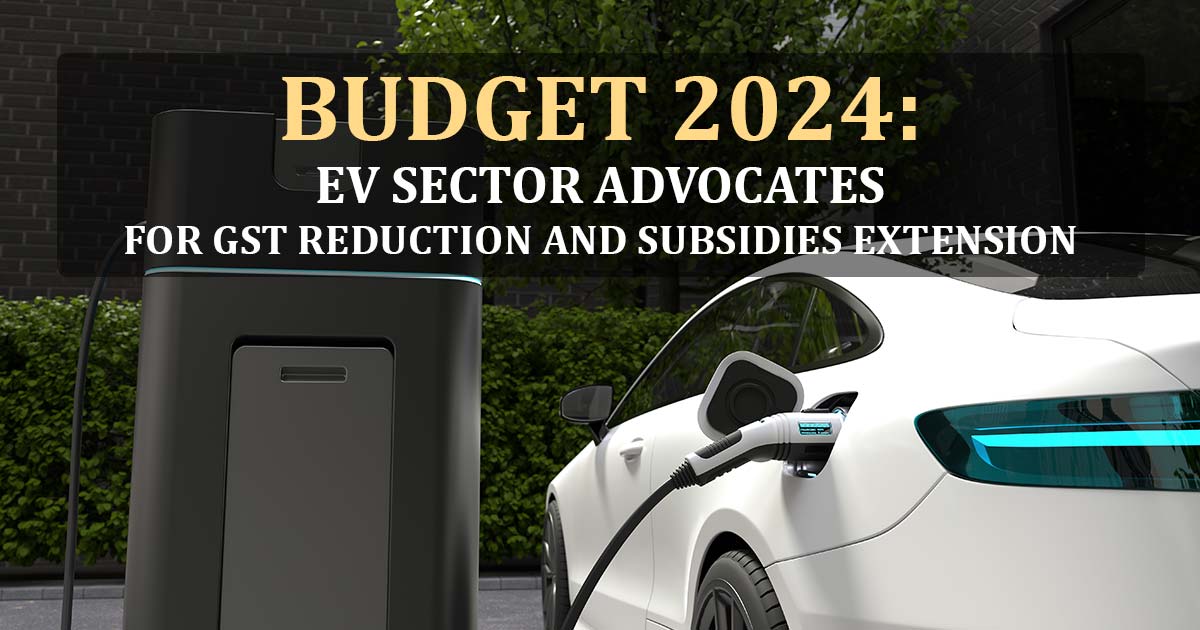
On 1st February, the interim budget 2024 will be presented by Finance Minister Nirmala Sitharaman, the electric vehicle (EV) industry is advocating for a series of tax and subsidy adjustments, as well as favorable policies, to support the ongoing growth in the sector.
The primary appeal from players in the electric vehicle (EV) sector is to establish a fair playing field concerning taxation, particularly addressing the elevated goods and service tax (GST) imposed on EV batteries. These batteries constitute a significant portion of the overall higher initial cost of electric vehicles.
Reducing the GST on batteries from 18% to 5% would substantially lower the cost of EVs for consumers, fostering a faster adoption rate. Additionally, this adjustment would enable manufacturers to allocate more resources to research and development, promoting further innovation in their products.
Although GST rate adjustments fall under the jurisdiction of the GST Council rather than the Ministry of Finance, industry leaders are optimistic that the forthcoming budget speech might convey supportive language.
The sector is also seeking a diminished duty on the import of EV spare parts to enhance cost competitiveness within the industry. Reducing customs duty on EV components in the previous budget stimulated local manufacturing, and similar modifications are anticipated in the 2024 budget.
The industry is expecting an extension of the Faster Adoption & Manufacturing of Electric Vehicles (FAME II) subsidy, set to expire on March 31. This subsidy encourages the domestic manufacturing of EVs and has provided relief for over 12.16 lakh electric vehicles, incurring an expenditure of Rs 5,422 crore as of December 2023. A proposed FAME III subsidy is currently under consideration, and there is a call from the industry to extend the existing scheme until the new version is approved.
According to FICCI’s proposal, FAME III is estimated to require an expenditure exceeding Rs 30,000 crore in the next five years. This new scheme has the potential to further strengthen the EV industry and sustain the momentum of EV adoption in India.
Read Also: Isma Urges Morth to Remain Same GST on Flex-Fuel Vehicles as For EVs
Our request is to include EV component manufacturers in FAME III to ensure the closure of all loopholes that may allow original equipment manufacturers (OEMs) to directly procure from China and merely assemble the components here.
In addition to FAME, the production-linked incentives (PLI) schemes have played a crucial role in stimulating domestic manufacturing efforts in recent years. It would be advantageous if the upcoming budget included provisions to broaden the scope of PLI schemes, thereby enhancing overall manufacturing demand and ensuring effective utilization of incentives.
Anticipations also include a higher capital allocation towards sustainable energy and cleantech in the interim budget, aligning with India’s goal to reduce carbon emissions by 50% by 2030.
Recommend: Tax Deduction on Loan Interest While Buying EVs U/S 80EEB
As the electric vehicle revolution gains momentum, the integration of renewable energy into the national grid becomes essential. A strategic budget allocation for renewable energy is not only expected to power homes but also to propel the growing electric vehicle segment.
These investments are anticipated to be channeled into services such as EV charging and battery swapping, aiming to address the persisting challenge of range anxiety that significantly hampers overall EV adoption.
Beyond financial allocations, we anticipate the budget to unveil a comprehensive policy framework for EVs, covering aspects like licensing, safety standards, and insurance norms tailored specifically for electric vehicles.
Among the anticipated policy changes is the introduction of a comprehensive Battery Swapping Policy, recognizing its crucial role in expediting the adoption of electric mobility and meeting the 2030 targets for EV penetration. This policy should encompass subsidies for the service and establish an equitable GST structure for its implementation.








